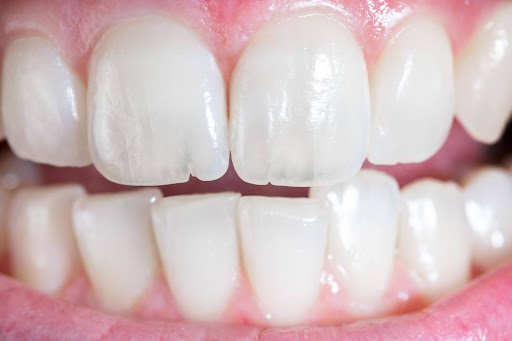Can Broken Teeth Be Restored?

Are you scared of biting down or experiencing discomfort while chewing? These could be signs of weakened and brittle teeth. Worn teeth are more susceptible to breakage and chipping, which affects not only your oral health but also your daily life. Frequent dental visits for repairs and fillings can be costly, and the constant worry of damaging your teeth can be stressful. However, treatments and preventive measures are available to strengthen your teeth and shield them from further damage. Explore the causes of broken teeth and learn about teeth restoration treatment options in our blog.
Why Do Teeth Become Weak?
Tooth enamel is the hardest substance in the body, stronger even than your bones. It protects your inner tooth layer from cavities and damage. However, with time, it can wear down and become weaker. Other factors, such as your hygiene and eating habits, also damage enamel.
Some of the factors that can cause enamel damage include:
Poor Oral Hygiene
Plaque, a sticky, colourless film of bacteria, forms on the teeth and along the gumline when bacteria in the mouth combine with sugars and starches from food particles to produce acids. If not removed regularly through proper oral hygiene practices such as brushing and interdental cleaning, plaque can build up and harden into tartar or dental calculus. This can lead to cavities, gum disease and weakening of the enamel. Daily brushing with a strong fluoride toothpaste and regular dental checkups and cleaning are essential to remove bacteria and maintain strong and healthy teeth.
Tooth Decay
Tooth decay weakens teeth by eroding the protective enamel layer. Bacteria in the mouth produce acids from sugars and starches in food, which attack the enamel, leaching out minerals like calcium and phosphate. This softens and weakens the enamel, making the tooth more prone to cavities. As decay progresses, it can compromise the tooth’s structure, leading to breakage, sensitivity, and infection.
Gum Disease
Gum disease damages the supporting structures of the teeth, including the gums and jawbone. It begins with inflammation of the gums, caused by plaque buildup and tartar along the gumline. This is the early stage of gum disease called gingivitis. If left untreated, gingivitis can progress to periodontitis, which can lead to infection and inflammation spreading to the supporting tissues and bones of the teeth. As gum disease advances, the gums may recede, exposing more of the tooth’s root and creating pockets where bacteria can accumulate. Chronic inflammation and infection associated with gum disease can damage the jawbone, leading to bone loss and weakening the teeth’ support structure.
Teeth Grinding
Teeth grinding, or bruxism can weaken teeth through repeated pressure and friction. The constant grinding motion wears down the protective enamel layer, leaving them vulnerable to damage and decay. Excessive force can cause fractures or cracks in the teeth, weakening their structural integrity. If left untreated, bruxism can result in tooth sensitivity, increased risk of dental issues, and compromised oral health.
Overuse of Fillings
Dental fillings are not the solution to fix all tooth damage. They should only be used to fill small to medium holes after tooth decay has been removed. When used for large holes where most of the original tooth structure has been lost, it results in a weak tooth and weak filling which may leak and break over time, necessitating the filling to be redone. Each time the filling is redone, the tooth will lose more tooth structure, leaving behind more filling material than the tooth. Teeth with multiple or large fillings may be more prone to fractures or cracks, increasing the risk of structural damage. If you notice yourself undergoing dental visits every year or two for new fillings, this can weaken your teeth.
A cavity that exceeds 50% of your tooth’s size significantly weakens it. The remaining tooth structure surrounding the filling becomes fragile and delicate, similar to an eggshell. In such cases, the filling fails to protect the frail outer layers of your tooth, leaving them vulnerable. As the filling expands, the remaining tooth structure grows thinner and weaker.
Ageing
As we age, the natural reduction in bone density can affect the jawbone’s support for teeth, leading to increased susceptibility to tooth mobility and damage. Years of wear and tear from chewing, grinding, and other factors can gradually erode tooth structure, making teeth more vulnerable to decay and fractures. Ageing also contributes to gum recession, dry mouth, and reduced healing capacity, all of which can weaken teeth and compromise oral health. To mitigate the effects of ageing and tooth loss on dental health, maintaining proper oral hygiene, attending regular dental checkups, and seeking prompt treatment for oral health issues are vital.
Other factors that can weaken the tooth enamel include abrasive brushing and consuming acidic foods and beverages. Ask your dentist about the correct brushing technique to avoid tooth and gum abrasion, and always use a soft-bristled toothbrush. Rinse your mouth with water after acidic foods to prevent enamel erosion.
Treatments for Broken Teeth
The treatment for broken teeth usually depends on the severity of the damage and the condition of your teeth. It begins with a dental examination and X-rays to assess the damage and create a tailored treatment plan. Depending on the damage, your dentist may suggest the following:
Dental Crowns
Dental crowns are tooth-coloured caps that cover teeth that have been weakened due to excessive decay, dental trauma, multiple fillings, chips or cracks or after a root canal surgery. They help restore structure, strength and appearance to damaged teeth, covering the weakened teeth and enhancing dental function. Dental crowns are generally recommended for teeth damaged due to multiple fillings, excessive decay, cracked or fractured teeth or after a root canal treatment.
At Whitehorse Dental, we do our best to preserve your natural teeth, repairing the damage and strengthening the structure. We believe your natural teeth can be maintained and restored with preventive and restorative care for a lasting and healthy smile. Crown treatments can last over 12 years with proper, regular preventative care. In contrast, large fillings may need to be redone every few years. Dental crowns are only recommended for weakened teeth prone to breakage. A healthy tooth or a small hole does not require a dental crown. They are permanent and fixed, allowing you the functionality of a natural tooth. They also improve oral health by reducing the risk of infection and decay because the tooth is protected with a dental crown.
Root Canal
Root canal treatment is a solution to save a tooth that would otherwise need to be removed. This treatment helps to fix problems in the inner part of the tooth, called the dental pulp, which contains nerves and blood vessels. If the pulp gets infected due to deep decay, cracks, or inflammation, a root canal may be recommended to remove the damaged pulp, clean the canal, and seal it off. This process relieves pain, stops the infection from spreading, and allows the natural tooth to stay in place.
Dental Fillings
Dental fillings restore and repair teeth damaged by decay or trauma. They are applied to the affected area of the tooth after the decayed or damaged portion has been removed. They are only suitable for small to moderate cavities, helping seal off the damaged area and preventing bacteria from entering and causing further decay. Fillings restore the tooth’s shape and function, enabling normal chewing and biting, strengthening weakened areas of the tooth, and helping to prevent fractures or breakage.
Dental Veneers
Dental veneers are thin shells made of composite resin or porcelain. They cover minor tooth imperfections such as chips, cracks, discolouration, or changes in size and shape to fix gaps or cookedness. Veneers are a cosmetic dental procedure to enhance smile aesthetics, mostly used for superficial cracks and fractures in the front teeth.
Tooth Extraction
Broken teeth that are severely damaged and cannot be saved with restorative treatments usually have to be extracted. This is a last resort when there are no other options. Leaving a damaged tooth can affect the surrounding healthy teeth and increase the risk of future dental problems.
Preventive Care for Weak Teeth
Weak or brittle teeth can be protected and maintained with preventive care. This helps preserve tooth enamel and structure, safeguarding them from breakage or pain.
Here are a few things you can do to strengthen and prevent weak teeth:
Flouride Treatments – involve the application of fluoride varnish or gel to the teeth, which helps strengthen enamel, making teeth more resistant to decay and reducing the risk of cavities.
- Dental Sealants – Thin, protective coatings applied to the chewing surfaces of molars and premolars to seal off the deep grooves and pits where bacteria and food particles can accumulate, helping prevent tooth decay.
- Dental Checkups – We recommend regular dental checkups to assess your dental health and detect early signs of oral problems for timely intervention. Professional cleanings also help remove plaque and tartar, eliminating bacteria from inaccessible areas.
- Consistent Oral Hygiene – Brushing twice daily and cleaning between the teeth keeps bacteria away for a strong and healthy smile.
- Balanced and Healthy Diet – Avoiding foods high in sugar or processed junk can protect your tooth enamel and prevent tooth decay and plaque buildup.
A Healthy Smile Begins with You!
Tooth enamel may be harder than bone, but even the strongest material can break if not taken care of. You only get one set of permanent teeth, so keep them healthy and preserve them with preventive care. At Whitehorse Dental, we don’t believe in quick fixes or drill-and-fill methods. We aim to provide long-term solutions that identify the underlying cause of your dental problem for accurate and precise treatments. Our Blackburn dentists create tailored plans that align with your dental needs, ensuring consistent improvement in your dental health for a smile that will stay radiant and healthy for years to come. Book a consultation with us today to begin your dental journey.

